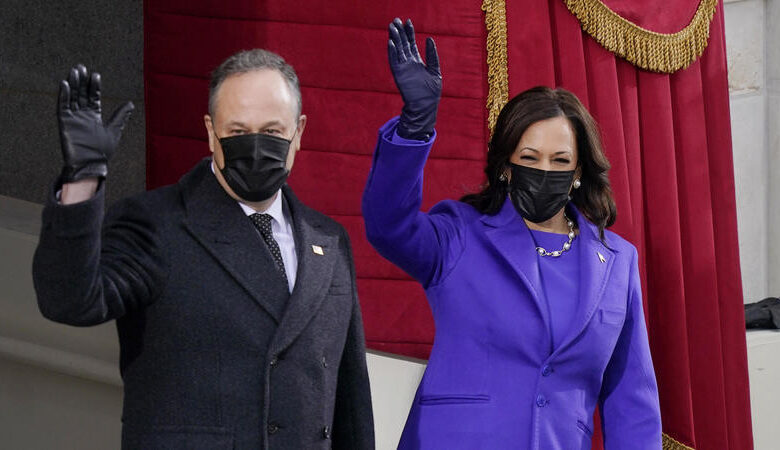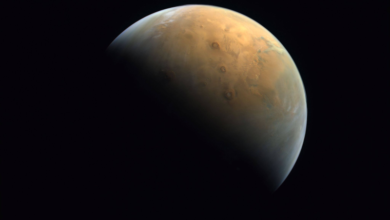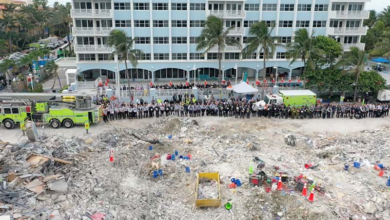‘Madam Vice President’ Kamala Harris has opened a new chapter in US politics

For more than two centuries, the top ranks of American power have been dominated by men — almost all of them white. That ends today.
Kamala Harris is the first female US vice president — and the first Black woman and person of South Asian descent to hold the role.
After taking the oath of office, a beaming Harris hugged her husband, Douglas Emhoff, and gave President-elect Joe Biden a first bump.
Meanwhile, thousand of miles away, people in a tiny Indian village, surrounded by rice paddies, flocked to a Hindu temple, burst crackers and uttered prayers for its descendant and the new VP.
Groups of women in bright saris and men wearing white dhotis thronged the temple with sweets and flowers, offering special prayers for Harris’ success.
“We are feeling very proud that an Indian is being elected as the vice president of America,” said Anukampa Madhavasimhan, a teacher.
Historic rise
Harris’ rise is historic in any context, another moment when a stubborn boundary will fall away, expanding the idea of what’s possible in American politics. But it’s particularly meaningful because she is taking office at a moment of deep consequence, with Americans grappling over the role of institutional racism and confronting a pandemic that has disproportionately devastated Black and brown communities.
Those close to Harris say she’ll bring an important — and often missing — perspective in the debates on how to overcome the many hurdles facing the incoming administration.
“In many folks’ lifetimes, we experienced a segregated United States,” said Lateefah Simon, a civil rights advocate and longtime Harris friend and mentee. “You will now have a Black woman who will walk into the White House not as a guest but as a second in command of the free world.”
Harris — the child of immigrants, a stepmother of two and the wife of a Jewish man — “carries an intersectional story of so many Americans who are never seen and heard”.
All roads led to the White House
Harris, 56, moved into the vice presidency just four years after she first went to Washington as a senator from California, where she’d previously served as attorney general and as San Francisco’s district attorney. She had expected to work with a White House run by Hillary Clinton, but President Donald Trump’s victory quickly scrambled the nation’s capital and set the stage for the rise of a new class of Democratic stars.
Her swearing-in comes almost two years to the day after Harris launched her own presidential bid on Martin Luther King Jr Day in 2019. Her campaign fizzled before primary voting began, but Harris’ rise continued when Joe Biden chose her as his running mate last August. Harris had been a close friend of Beau Biden, the elder son of Joe Biden and a former Delaware attorney general who died in 2015 of cancer.
“We’re turning the page off a really dark period in our history,” said Long Beach, California, Mayor Robert Garcia, a Harris ally. As Democrats celebrate the end to Trump’s presidency, Garcia said he hopes the significance of swearing in the nation’s first female vice president isn’t overlooked.
“That is a huge historical moment that should also be uplifted,” he said.
Beginning of women of colour in leadership positions
Harris has often reflected on her rise through politics by recalling the lessons of her mother, who taught her to take on a larger cause and push through adversity.
For more than two centuries, the top ranks of American power have been dominated by men — almost all of them white. That ends today.
Kamala Harris is the first female US vice president — and the first Black woman and person of South Asian descent to hold the role.
After taking the oath of office, a beaming Harris hugged her husband, Douglas Emhoff, and gave President-elect Joe Biden a first bump.
Meanwhile, thousand of miles away, people in a tiny Indian village, surrounded by rice paddies, flocked to a Hindu temple, burst crackers and uttered prayers for its descendant and the new VP.
Groups of women in bright saris and men wearing white dhotis thronged the temple with sweets and flowers, offering special prayers for Harris’ success.
“We are feeling very proud that an Indian is being elected as the vice president of America,” said Anukampa Madhavasimhan, a teacher.
Historic rise
Harris’ rise is historic in any context, another moment when a stubborn boundary will fall away, expanding the idea of what’s possible in American politics. But it’s particularly meaningful because she is taking office at a moment of deep consequence, with Americans grappling over the role of institutional racism and confronting a pandemic that has disproportionately devastated Black and brown communities.
Those close to Harris say she’ll bring an important — and often missing — perspective in the debates on how to overcome the many hurdles facing the incoming administration.
“In many folks’ lifetimes, we experienced a segregated United States,” said Lateefah Simon, a civil rights advocate and longtime Harris friend and mentee. “You will now have a Black woman who will walk into the White House not as a guest but as a second in command of the free world.”
Harris — the child of immigrants, a stepmother of two and the wife of a Jewish man — “carries an intersectional story of so many Americans who are never seen and heard”.
All roads led to the White House
Harris, 56, moved into the vice presidency just four years after she first went to Washington as a senator from California, where she’d previously served as attorney general and as San Francisco’s district attorney. She had expected to work with a White House run by Hillary Clinton, but President Donald Trump’s victory quickly scrambled the nation’s capital and set the stage for the rise of a new class of Democratic stars.
Her swearing-in comes almost two years to the day after Harris launched her own presidential bid on Martin Luther King Jr Day in 2019. Her campaign fizzled before primary voting began, but Harris’ rise continued when Joe Biden chose her as his running mate last August. Harris had been a close friend of Beau Biden, the elder son of Joe Biden and a former Delaware attorney general who died in 2015 of cancer.
“We’re turning the page off a really dark period in our history,” said Long Beach, California, Mayor Robert Garcia, a Harris ally. As Democrats celebrate the end to Trump’s presidency, Garcia said he hopes the significance of swearing in the nation’s first female vice president isn’t overlooked.
“That is a huge historical moment that should also be uplifted,” he said.
Beginning of women of colour in leadership positions
Harris has often reflected on her rise through politics by recalling the lessons of her mother, who taught her to take on a larger cause and push through adversity.
“I was raised to not hear ‘no’. Let me be clear about it. So it wasn’t like, “Oh, the possibilities are immense. Whatever you want to do, you can do’,” she recalled during a CBS Sunday Morning interview that aired last week. “No, I was raised to understand many people will tell you, ‘It is impossible, but don’t listen’.”
Harris’ swearing-in holds more symbolic weight than that of any vice president in modern times; people who want to understand Harris and connect with her will have to learn about what it means to graduate from a historically Black college and university rather than an Ivy League school, said Martha S. Jones, a professor of history at Johns Hopkins University and the author of Vanguard: How Black Women Broke Barriers, Won the Vote, and Insisted on Equality for All.
“Folks are going to have to adapt to her rather than her adapting to them,” Jones said.
Her election to the vice presidency should be just the beginning of putting Black women in leadership positions, Jones said, particularly after the role Black women played in organising and turning out voters in the November election.
“We will all learn what happens to the kind of capacities and insights of Black women in politics when those capacities and insights are permitted to lead,” Jones said, adding people will have to understand Harris’ traditions, like the Hindu celebration of Diwali.
Harris’ grandfather was born in Thulasendrapuram more than 100 years ago. Many decades later, he moved to Chennai, the capital of Tamil Nadu state. Harris’ late mother was also born in India, before moving to the US to study at the University of California. She married a Jamaican man, and they named their daughter Kamala, a Sanskrit word for “lotus flower”.
In several speeches, Harris has often spoken about her roots and how she was guided by the values of her Indian-born grandfather and mother.
So when Joe Biden and Harris triumphed in the US election last November, Thulasendrapuram became the centre of attention in entire India.
Local politicians flocked to the village and young children carrying placards with photos of Harris ran along the dusty roads.
Then and now, villagers set off firecrackers and distributed sweets and flowers as a religious offering.
Posters and banners of Harris from November still adorn walls in the village and many hope she ascends to the presidency in 2024. Biden has skirted questions about whether he will seek reelection or retire.
“For the next four years, if she supports India, she will be the president,” said G. Manikandan, who has followed Harris politically and whose shop proudly displays a wall calendar with pictures of Biden and Harris.







